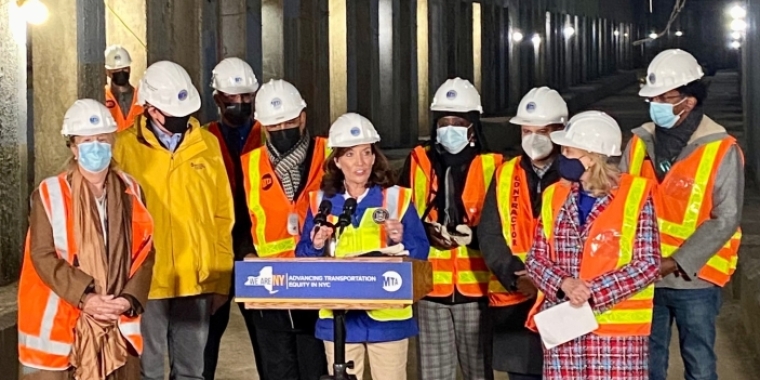
Statement from Senator Serrano on Historic Rent Reforms and Tenant Protections
June 14, 2019
The New York State Senate today voted to pass the Housing Stability and Tenant Protection Act of 2019 (S6458). This legislation, a 2-way agreement with the State Assembly Majority, was drafted following multiple legislative hearings throughout the state and discussions with advocates, tenants, and stakeholders.
"As a longtime advocate for tenants' rights, I am thrilled that my colleagues and I have crafted and passed the strongest tenant protections and affordable housing legislation in the recent history of our state. For too long, low and middle-income New Yorkers have been victims of the affordable housing crisis - many suffering landlord harassment and displacement from their rent-regulated or rent-stabilized units. Today's vote balances the playing field between tenants and landlords and extends protections to renters across the state. This victory could not have been possible without the tireless advocacy of tenants' groups from across New York City and the leadership of our Senate Majority Leader Andrea Stewart-Cousins, who ensured that significant rent reform remained a top priority for the State Legislature.
"I am especially pleased that included in this package are provisions from my legislation to eliminate the Vacancy Bonus, which currently allows landlords of stabilized units to raise the rent by up to 20 percent after a vacancy, rapidly transforming a rent-regulated apartment into one that is market rate and decontrolled. The reforms we passed today also include an end to Vacancy Decontrol, which removed units that became vacant from stabilization if the rent reached a certain rate or if the tenant's income reached $200,000 or higher. This led to the deregulation of more than 300,000 units. New York's rent laws, which also allowed significant rent hikes based on hard-to-track renovation costs, attracted predatory investment and provided landlords with an incentive to harass tenants. Neighborhoods that I represent in East Harlem and the Bronx have been hit particularly hard by powerful corporations and private equity firms looking to profit on our homes.
"Preserving existing affordable housing is a key component of tackling the affordability crisis, and these reforms will ensure that tenants are not only able to remain in the communities they call home, but that they are empowered to stand up for their rights."
The legislation passed by the State Senate Majority:
Extends the Rent Regulations Laws and Makes them Permanent:
-Rent Regulation laws have been scheduled to expire every four to eight years for decades. This bill makes the rent regulation system permanent, so they will not sunset at any time in the future without an act of the Legislature to repeal or terminate them.
Repeals High Rent Vacancy Deregulation & High Income Deregulation:
-Repeals the provisions that allow removal of units from rent stabilization when the rent crosses a statutory high-rent threshold and the unit becomes vacant or the tenant’s income is $200,000 or higher in the preceding two years. This led to the deregulation of more than 300,000 units since they were first passed in 1994.
Reforms Owner Use Exception to Rent Regulation:
- Limits the use of the “owner use” provision to a single unit, requires that the owner or their immediate family use the unit as their primary residence, and protects long-term tenants from eviction under this exception by reducing the current length of tenancy required to be protected from eviction to 15 years.
Keeps Stabilized Apartments Rented by Nonprofits in the Rent Stabilization System:
- Limits the temporary non-profit exception to rent stabilization by requiring units to remain rent-stabilized if they are provided to individuals who are or were homeless or are at risk of homelessness.
- Provides that individuals permanently or temporarily housed by nonprofits status as tenants while ensuring that units used for these purposes remain rent stabilized.
Repeals the Vacancy Bonus & Longevity Bonus:
- Repeals the “vacancy bonus” provision that allows a property owner to raise rents as much as 20% each time a unit becomes vacant.
- It also repeals the “longevity bonus” provision that allows rents to be raised by additional amounts based on the duration of the previous tenancy.
- Prohibits local Rent Guidelines Boards from reinstating vacancy bonus on their own.
Prohibits Rent Guidelines Board from Setting Class-Specific Renewal Increases:
- Prohibits Rent Guidelines Boards from setting additional increases based on the current rental cost of a unit or the amount of time since the owner was authorized to take additional rent increases, such as a vacancy bonus.
Makes Preferential Rents the Base Rent for Lease Renewal Increases:
- Prohibits owners who have offered tenants a “preferential rent” below the legal regulated rent from raising the rent to the full legal rent upon renewal.
- Once the tenant vacates, the owner can charge any rent up to the full legal regulated rent, so long as the tenant did not vacate due to the owner’s failure to maintain the unit in habitable condition.
- Owners with rent-setting regulatory agreements with federal or state agencies will still be permitted to use preferential rents based on their particular agreements.
Provides Relief from Large Rent Increases for Rent-Controlled Tenants:
- Sets Maximum Collectible Rent increases at the average of the five most recent Rent Guidelines Board annual rent increases for one-year renewals.
- This bill also prohibits fuel pass-along charges.
Extends Rent Overcharge Four-Year Look-Back Period to Six Years:
- Extends the four-year look-back period to six or more years as reasonably necessary to determine a reliable base rent, and extends the period for which an owner can be liable for rent overcharge claims from two to six years.
- Allows tenants to assert their overcharge claims in court or at HCR and states that while an owner may discard records after six years, they do so at their own risk.
Reforms Rent Increases for Major Capital Improvements (MCIs):
- Lowers the rent increase cap from 6% to 2% in New York City and from 15% to 2% in other counties.
- Provides the same protections of the 2% cap going forward on MCI rent increases attributable to MCIs that became effective within the prior 7 years.
- Lowers increases further by lengthening the MCI formula’s amortization period.
- Eliminates MCI increases after 30 years instead of allowing them to remain in effect permanently. - Significantly tightens the rules governing what spending may qualify for MCI increases and tightens enforcement of those rules by requiring that 25% of MCIs be inspected and audited.
Reforms Rent Increases for Individual Apartment Improvements (IAIs):
-Caps the amount of IAI spending at $15,000 over a 15-year period and allow owners to make up to 3 IAIs during that time.
-Makes IAI increases temporary for 30 years rather than permanent and requires owners to clear any hazardous violations in the apartment before collecting an increase.
Requires Annual Report From HCR On Rent Administration and Tenant Protection:
- Requires the Division of Housing and Community Renewal to submit an annual report on the programs and activities undertaken by the Office of Rent Administration and the Tenant Protection Unit regarding implementation, administration, and enforcement of the rent regulation system.
Co-Op/Condo Conversion Reforms:
- Strengthens and makes permanent the system that protects tenants in buildings that owners seek to convert into co-ops or condos. - Eliminates the option of “eviction plans” and institutes reforms for non-eviction plans.
- Requires 51% of tenants in residents to agree to purchase apartments before the conversion can be effective. (Currently 15% of apartments must be sold and the purchasers may be outside investors.)
- For market-rate senior citizens and disabled tenants during conversion, evictions are permitted only for good cause, where an unconscionable rent increase does not constitute good cause.
Establishes Stronger Housing Security and Tenant Protections Statewide:
- Bans the use of so-called “tenant blacklists” - protecting tenants who enforce their rights.
- Limits security deposits to one month’s rent and provides required procedures to ensure the landlord promptly returns the security deposit.
- Includes a wide variety of protections for tenants during the eviction process, including strengthening protections against retaliatory evictions.
- Creates the crime of unlawful eviction, where a landlord illegally locks out or uses force to evict a tenant, as a Class A Misdemeanor and also punishable by a civil penalty of between $1,000 and $10,000 per violation. -Requires landlords to provide notice to tenants if they intend to increase the rent more than 5% or do not intend to renew the tenants’ lease.
-Provides tenants more time in eviction proceedings to get a lawyer, fix violations of the lease, or pay rent owed.
-Expands the ability of the court to stay an eviction for up to one year if the tenant cannot find a similar suitable dwelling in the same neighborhood after due and reasonable efforts or the eviction would cause extreme hardship.
Share this Article or Press Release
Newsroom
Go to Newsroom
Senator Serrano 2022 Veteran Hall of Fame
May 30, 2022

Renovation of La Placita and Harlem Night Market Inauguration
December 17, 2021

